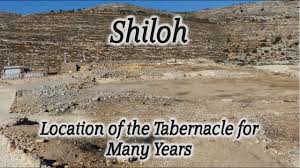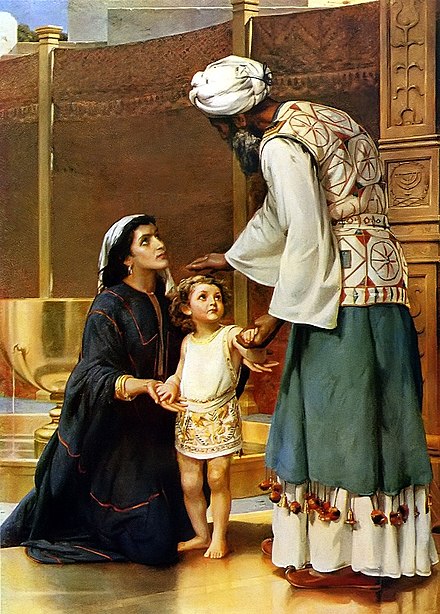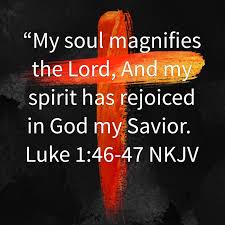
Hannah
Hannah, also spelled Anna, (11th century BC), mother of Samuel, the Jewish judge.
Childless as one of the two wives of Elkanah, she prayed for a son, promising to dedicate him to God.
Her prayers were answered, and she brought the child Samuel to Shiloh for religious training.
In the Talmud she is named as one of seven prophetesses,
and her prayer is in the Rosh Hashana (Jewish New Year) first-day service, exemplifying successful petitions to God. (Britannica)
Samuel’s Birth and DedicationThere was a certain man of Ramathaim, a Zuphite from the hill country of Ephraim, whose name was Elkanah son of Jeroham son of Elihu son of Tohu son of Zuph, an Ephraimite. He had two wives; the name of one was Hannah, and the name of the other Peninnah. Peninnah had children, but Hannah had no children. Now this man used to go up year by year from his town to worship and to sacrifice to the Lord of hosts at Shiloh, where the two sons of Eli, Hophni and Phinehas, were priests of the Lord. On the day when Elkanah sacrificed, he would give portions to his wife Peninnah and to all her sons and daughters; but to Hannah he gave a double portion, because he loved her, though the Lord had closed her womb. Her rival used to provoke her severely, to irritate her, because the Lord had closed her womb. So it went on year after year; as often as she went up to the house of the Lord, she used to provoke her. Therefore Hannah wept and would not eat. Her husband Elkanah said to her, ‘Hannah, why do you weep? Why do you not eat? Why is your heart sad? Am I not more to you than ten sons?’ After they had eaten and drunk at Shiloh, Hannah rose and presented herself before the Lord. Now Eli the priest was sitting on the seat beside the door post of the temple of the Lord. She was deeply distressed and prayed to the Lord, and wept bitterly. She made this vow: ‘O Lord of hosts, if only you will look on the misery of your servant, and remember me, and not forget your servant, but will give to your servant a male child, then I will set him before you as a nazirite until the day of his death. He shall drink neither wine nor intoxicants, and no razor shall touch his head.’ As she continued praying before the Lord, Eli observed her mouth. Hannah was praying silently; only her lips moved, but her voice was not heard; therefore Eli thought she was drunk. So Eli said to her, ‘How long will you make a drunken spectacle of yourself? Put away your wine.’ But Hannah answered, ‘No, my lord, I am a woman deeply troubled; I have drunk neither wine nor strong drink, but I have been pouring out my soul before the Lord. Do not regard your servant as a worthless woman, for I have been speaking out of my great anxiety and vexation all this time.’Then Eli answered, ‘Go in peace; the God of Israel grant the petition you have made to him.’ And she said, ‘Let your servant find favour in your sight.’ Then the woman went to her quarters, ate and drank with her husband, and her countenance was sad no longer. They rose early in the morning and worshipped before the Lord; then they went back to their house at Ramah. Elkanah knew his wife Hannah, and the Lord remembered her. In due time Hannah conceived and bore a son. She named him Samuel, for she said, ‘I have asked him of the Lord.’ The man Elkanah and all his household went up to offer to the Lord the yearly sacrifice, and to pay his vow. But Hannah did not go up, for she said to her husband, ‘As soon as the child is weaned, I will bring him, that he may appear in the presence of the Lord, and remain there for ever; I will offer him as a nazirite for all time.’ Her husband Elkanah said to her, ‘Do what seems best to you, wait until you have weaned him; only—may the Lord establish his word.’ So the woman remained and nursed her son, until she weaned him. When she had weaned him, she took him up with her, along with a three-year-old bull, an ephah of flour, and a skin of wine. She brought him to the house of the Lord at Shiloh; and the child was young. Then they slaughtered the bull, and they brought the child to Eli. And she said, ‘Oh, my lord! As you live, my lord, I am the woman who was standing here in your presence, praying to the Lord. For this child I prayed; and the Lord has granted me the petition that I made to him. Therefore I have lent him to the Lord; as long as he lives, he is given to the Lord.’ She left him there for the Lord.
Hannah prayed and said, Then Elkanah went home to Ramah, while the boy remained to minister to the Lord, in the presence of the priest Eli. Now the sons of Eli were scoundrels; they had no regard for the Lord or for the duties of the priests to the people. When anyone offered sacrifice, the priest’s servant would come, while the meat was boiling, with a three-pronged fork in his hand, and he would thrust it into the pan, or kettle, or cauldron, or pot; all that the fork brought up the priest would take for himself. This is what they did at Shiloh to all the Israelites who came there. Moreover, before the fat was burned, the priest’s servant would come and say to the one who was sacrificing, ‘Give meat for the priest to roast; for he will not accept boiled meat from you, but only raw.’ And if the man said to him, ‘Let them burn the fat first, and then take whatever you wish’, he would say, ‘No, you must give it now; if not, I will take it by force.’ Thus the sin of the young men was very great in the sight of the Lord; for they treated the offerings of the Lord with contempt. The Child Samuel at ShilohSamuel was ministering before the Lord, a boy wearing a linen ephod. His mother used to make for him a little robe and take it to him each year, when she went up with her husband to offer the yearly sacrifice. Then Eli would bless Elkanah and his wife, and say, ‘May the Lord repay you with children by this woman for the gift that she made to the Lord’; and then they would return to their home. And the Lord took note of Hannah; she conceived and bore three sons and two daughters. And the boy Samuel grew up in the presence of the Lord. Now Eli was very old. He heard all that his sons were doing to all Israel, and how they lay with the women who served at the entrance to the tent of meeting. He said to them, ‘Why do you do such things? For I hear of your evil dealings from all these people. No, my sons; it is not a good report that I hear the people of the Lord spreading abroad. If one person sins against another, someone can intercede for the sinner with the Lord;but if someone sins against the Lord, who can make intercession?’ But they would not listen to the voice of their father; for it was the will of the Lord to kill them. Now the boy Samuel continued to grow both in stature and in favour with the Lord and with the people. A man of God came to Eli and said to him, ‘Thus the Lord has said, “I revealed myself to the family of your ancestor in Egypt when they were slaves to the house of Pharaoh. I chose him out of all the tribes of Israel to be my priest, to go up to my altar, to offer incense, to wear an ephod before me; and I gave to the family of your ancestor all my offerings by fire from the people of Israel. Why then look with greedy eye at my sacrifices and my offerings that I commanded, and honour your sons more than me by fattening yourselves on the choicest parts of every offering of my people Israel?” Therefore the Lord the God of Israel declares: “I promised that your family and the family of your ancestor should go in and out before me for ever”; but now the Lord declares: “Far be it from me; for those who honour me I will honour, and those who despise me shall be treated with contempt. See, a time is coming when I will cut off your strength and the strength of your ancestor’s family, so that no one in your family will live to old age. Then in distress you will look with greedy eye on all the prosperity that shall be bestowed upon Israel; and no one in your family shall ever live to old age. The only one of you whom I shall not cut off from my altar shall be spared to weep out his eyes and grieve his heart; all the members of your household shall die by the sword. The fate of your two sons, Hophni and Phinehas, shall be the sign to you—both of them shall die on the same day. I will raise up for myself a faithful priest, who shall do according to what is in my heart and in my mind. I will build him a sure house, and he shall go in and out before my anointed one for ever. Everyone who is left in your family shall come to implore him for a piece of silver or a loaf of bread, and shall say, Please put me in one of the priest’s places, that I may eat a morsel of bread.” ’ (1 Samuel 1,2) 
|
Hannah’s PrayerHannah prayed and said,
|
The Magnificat of Mary |









